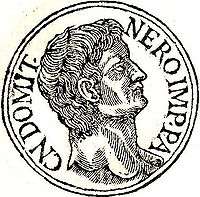Gnaeus Domitius Ahenobarbus (father of Nero)
Gnaeus Domitius Ahenobarbus (11 December 17 BC – January 41 AD) was a close relative of the five Roman Emperors of the Julio-Claudian dynasty. Domitius was the only son of Antonia Major (niece of the emperor Augustus and daughter of Augustus' sister Octavia Minor) and Lucius Domitius Ahenobarbus (consul 16 BC). His siblings were Domitia Lepida the Elder and Domitia Lepida the Younger, mother of the empress Valeria Messalina (third wife of the Emperor Claudius). Brother-in-law and first cousin once removed of the Emperor Caligula; maternal cousin of the Emperor Claudius and the biological father to the Emperor Nero.[1]
Gnaeus Domitius Ahenobarbus | |
|---|---|
| consul 32 AD | |
Bust of Gnaeus Domitius Ahenobarbus | |
| Born | 11 December 17 BC |
| Died | January 41 AD |
| Noble family | Domitii Ahenobarbi gens |
| Spouse(s) | Agrippina the Younger |
| Issue | |
| Father | Lucius Domitius Ahenobarbus (consul 16 BC) |
| Mother | Antonia Major |
Biography
Domitius was born in around 17BC [2][3] (though some sources argue he was born a generation later in 2 BC), the great-nephew of the reigning Emperor Augustus through his mother Antonia Major. He was closely related to several notable figures who would dominate the Roman Empire during the 1st century. Describing him as "despicable and dishonest", Suetonius says that as a young man, Domitius was serving on the staff of his second cousin Gaius Caesar in the East, in 2 AD. Gaius was a son of Marcus Vipsanius Agrippa and Julia the Elder, daughter of Augustus. Domitius fortified their friendship by killing his freedman for refusing to drink as much as he was told.[4] The reported reason was that the freedman did not get as drunk as Domitius did. On the Appian Way, Domitius was reported to have deliberately run over a child who was playing with his doll. At the Roman Forum, Domitius reportedly pulled out an eye of an equestrian because the equestrian openly criticized him. Gaius Stern claims that the Eastern expedition is actually that of Germanicus in AD 17-19, if one assumes his birth to be in 2BC.[5]
Domitius cheated on bankers for purchases he made. When he was Praetor, Domitius would swindle the prize money of victorious charioteers. Managers would complain, but Domitius decreed that future prizes would be paid on the spot. Domitius was also considered a serious womanizer. The Emperor Tiberius charged him with treason, adultery and incest with his sister and also with adultery with another noblewoman, but the ascension of Caligula saved him.
Domitius married his first cousin once removed Agrippina the Younger, Caligula's sister, after her thirteenth birthday in 28.[6] He was around 44 years old at the time. Tiberius arranged and ordered the marriage which was celebrated in Rome. Domitius was wealthy but apparently he and Agrippina chose to live between Antium (Anzio) and Rome.
Domitius was Consul in 32 and appointed by Tiberius as a commissioner in early 37. His son Lucius Domitius Ahenobarbus, later Emperor Nero, was born on 15 December 37 in Antium. According to Suetonius, when Domitius was congratulated by his friends for the birth of his son he replied that any child born to him and Agrippina would have a detestable nature and become a public danger, a fact that became true during the second part of Nero's reign. When Nero castrated a boy named Sporus and married him as a wife, Suetonius quoted one Roman who lived around this time who remarked that the world would have been better off if Nero's father had married someone more like the castrated boy.[7]
He died of edema at Pyrgi (an ancient Etruscan city) in January 41. In Domitius' will, Nero inherited 1/3 of his estate, but Caligula, who was also mentioned in the will, took Nero's inheritance for himself. When Claudius became Emperor, Nero's inheritance was restored.[8][9][10][11]
Legacy

During his lifetime, Domitius did not enjoy a good reputation. He was accused of being the accomplice of Albucilla in the crimes of adultery and murder, and also of incest with his sister Domitia Lepida Minor, and narrowly escaped execution only because of the death of Tiberius.[1]
His widow Agrippina later married her widowed uncle Claudius. Lucius was adopted by the elderly Claudius as Nero Claudius Caesar Drusus Germanicus. When Claudius died on October 13, 54, Nero succeeded him as Nero Claudius Caesar Augustus Germanicus. Nero exalted Domitius’ memory and the Roman Senate arranged for the construction of his statue in 55.
See also
References
- Smith, William (1867), "Ahenobarbus (10), Gnaeus Ahenobarbus", in Smith, William (ed.), Dictionary of Greek and Roman Biography and Mythology, 1, Boston: Little, Brown and Company, p. 86
- Roman Women: The Women who influenced the History of Rome: "In AD 28, on her thirteenth birthday, she was married off by Tiberius to her second cousin, the consul Gnaeus Domitius Ahenobarbus (b. 17 BC)."
- Jesus Among the Julio-Claudians: "(Gnaeus Domitius Ahenobarbus is thought by some to not have been born until around 2 BC or 1 BC (when Antonia Major would have been 37 or 38 years old). However, the earlier date of 17 BC is the only one that fits an association with Lucius Caesar"
- Suetonius
- Gaius Stern, "Nero's Father, the Ara Pacis, and the Ravenna Relief," CAAS 2015.
- Tac. Ann. 4.75.
- Ancient History Sourcebook: Suetonius: De Vita Caesarum--Nero, c. 110 C.E.
- Suetonius, Nero 5, 6
- Tacitus, Annales iv. 75, vi. 1, 47, xii. 64
- Marcus Velleius Paterculus ii. 72
- Cassius Dio, lviii. 17
| Political offices | ||
|---|---|---|
| Preceded by Publius Memmius Regulus, and Lucius Fulcinius Trio as Suffect consuls |
Consul of the Roman Empire 32 with Lucius Arruntius Camillus Scribonianus, followed by Aulus Vitellius |
Succeeded by Galba, and Lucius Cornelius Sulla Felix as Ordinary consuls |